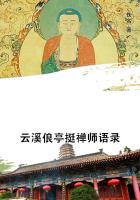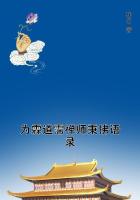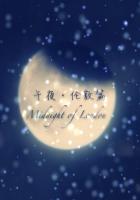It seemed to them that suddenly the lights went out; and a darkness like a rushing wind swept past them, filled with many sounds. And then forgetfulness. And then the coming back of light.
They were seated at a table, glittering with silver and dainty chinaware, to which the red wine in Venetian goblets, the varied fruit and flowers, gave colour. The room, furnished too gorgeously for taste, they judged to be a private cabinet in one of the great restaurants. Of such interiors they had occasionally caught glimpses through open windows on summer nights. It was softly illuminated by shaded lamps. The Stranger's face was still in shadow. But what surprised each of the three most was to observe opposite him two more or less bald-headed gentlemen of somewhat flabby appearance, whose features, however, in some mysterious way appeared familiar. The Stranger had his wine-glass raised in his hand.
"Our dear Paul," the Stranger was saying, "has declined, with his customary modesty, any public recognition of his triumph. He will not refuse three old friends the privilege of offering him their heartiest congratulations. Gentlemen, I drink not only to our dear Paul, but to the French Academy, which in honouring him has honoured France."
The Stranger, rising from his chair, turned his piercing eyes--the only part of him that could be clearly seen--upon the astonished Poet. The two elderly gentlemen opposite, evidently as bewildered as Paul himself, taking their cue from the Stranger, drained their glasses. Still following the Stranger's lead, leant each across the table and shook him warmly by the hand.
"I beg pardon," said the Poet, "but really I am afraid I must have been asleep. Would it sound rude to you"--he addressed himself to the Stranger: the faces of the elderly gentlemen opposite did not suggest their being of much assistance to him--"if I asked you where I was?"
Again there flickered across the Stranger's face the smile that was felt rather than seen. "You are in a private room of the Cafe Pretali," he answered. "We are met this evening to celebrate your recent elevation into the company of the Immortals."
"Oh," said the Poet, "thank you."
"The Academy," continued the Stranger, "is always a little late in these affairs. Myself, I could have wished your election had taken place ten years ago, when all France--all France that counts, that is--was talking of you. At fifty-three"--the Stranger touched lightly with his fingers the Poet's fat hand--"one does not write as when the sap was running up, instead of down."
Slowly, memory of the dingy cafe in the Rue St. Louis, of the strange happening that took place there that night when he was young, crept back into the Poet's brain.
"Would you mind," said the Poet, "would it be troubling you too much to tell me something of what has occurred to me?"
"Not in the least," responded the agreeable Stranger. "Your career has been most interesting--for the first few years chiefly to yourself. You married Marguerite. You remember Marguerite?"
The Poet remembered her.
"A mad thing to do, so most people would have said," continued the Stranger. "You had not a sou between you. But, myself, I think you were justified. Youth comes to us but once. And at twenty-five our business is to live. Undoubtedly the marriage helped you. You lived an idyllic existence, for a time, in a tumble-down cottage at Suresnes, with a garden that went down to the river. Poor, of course you were; poor as church mice. But who fears poverty when hope and love are singing on the bough! I really think quite your best work was done during those years at Suresnes. Ah, the sweetness, the tenderness of it! There has been nothing like it in French poetry.
It made no mark at the time; but ten years later the public went mad about it. She was dead then. Poor child, it had been a hard struggle. And, as you may remember, she was always fragile. Yet even in her death I think she helped you. There entered a new note into your poetry, a depth that had hitherto been wanting. It was the best thing that ever came to you, your love for Marguerite."
The Stranger refilled his glass, and passed the decanter. But the Poet left the wine unheeded.
"And then, ah, yes, then followed that excursion into politics.
Those scathing articles you wrote for La Liberte! It is hardly an exaggeration to say that they altered the whole aspect of French political thought. Those wonderful speeches you made during your election campaign at Angers. How the people worshipped you! You might have carried your portfolio had you persisted. But you poets are such restless fellows. And after all, I daresay you have really accomplished more by your plays. You remember--no, of course, how could you?--the first night of La Conquette. Shall I ever forget it!
I have always reckoned that the crown of your career. Your marriage with Madame Deschenelle--I do not think it was for the public good.
Poor Deschenelle's millions--is it not so? Poetry and millions interfere with one another. But a thousand pardons, my dear Paul.
You have done so much. It is only right you should now be taking your ease. Your work is finished."
The Poet does not answer. Sits staring before him with eyes turned inward. The Painter, the Musician: what did the years bring to them? The Stranger tells them also of all that they have lost: of the griefs and sorrows, of the hopes and fears they have never tasted, of their tears that ended in laughter, of the pain that gave sweetness to joy, of the triumphs that came to them in the days before triumph had lost its savour, of the loves and the longings and fervours they would never know. All was ended. The Stranger had given them what he had promised, what they had desired: the gain without the getting.
Then they break out.
"What is it to me," cries the Painter, "that I wake to find myself wearing the gold medal of the Salon, robbed of the memory of all by which it was earned?"















